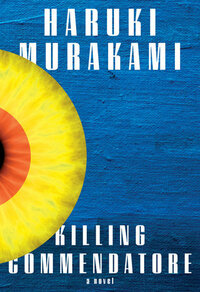You need to sign in or sign up before continuing.
Take a photo of a barcode or cover
adventurous
dark
emotional
mysterious
tense
slow-paced
Plot or Character Driven:
Plot
Loveable characters:
Yes
adventurous
mysterious
slow-paced
Plot or Character Driven:
A mix
Strong character development:
No
Loveable characters:
No
Diverse cast of characters:
No
Flaws of characters a main focus:
Complicated
Just finished reading Killing Commendatore by Haruki Murakami. What a strange and interesting novel. Just the right amount of sinister creepiness for me to feel that lovely spine tingle, and a great plot full of intrigue. It's one of his longer ones at 681 pages, but it kept me hooked throughout. Murakami never seems to answer as many questions as he poses, and sometimes I'd like a little more confirmation but on the whole I really enjoy his style and his bizarre and brilliant mind. 4.5 stars.
adventurous
emotional
mysterious
tense
slow-paced
Plot or Character Driven:
A mix
Strong character development:
Yes
Loveable characters:
Yes
Diverse cast of characters:
No
Flaws of characters a main focus:
Yes
emotional
lighthearted
mysterious
reflective
relaxing
slow-paced
adventurous
dark
mysterious
reflective
slow-paced
adventurous
mysterious
tense
fast-paced
Plot or Character Driven:
Character
Strong character development:
Yes
Loveable characters:
Yes
Diverse cast of characters:
Yes
Flaws of characters a main focus:
Complicated
Probably the most elegant book I have ever read.
I enjoyed it. I’m still piecing together the connections
I enjoyed it. I’m still piecing together the connections
emotional
mysterious
tense
slow-paced
Plot or Character Driven:
A mix
Strong character development:
No
Loveable characters:
Complicated
Diverse cast of characters:
Yes
Flaws of characters a main focus:
No
4 stars
The overall experience of reading Killing Commendatore, for someone who has been a fan of Murakami's past work, would be like slipping into a well-loved sweater—familiar and cozy.
There are a lot of returning elements: male protagonist in his mid-30s, detailed passage about cooking, specific music references (you can easily generate a Spotify playlist from his novels), and explicit, yet lyrical depiction of sex. I actually appreciate these recycled motifs as they act as security blanket of sort—creating a familiar foundation for the more fantastical elements.
This is definitely a more leisurely-paced Murakami novel, which I enjoy in parts, particularly the first portion with all the portrait sessions. Though repetitive as a narrative device, it remains a joy to read because the characters get opportunities to develop, and lot of intriguing subject matters (such as the concept of reality) get brought up and discussed. However, when the narrative shifts in its last third, from a contemplative character studies, to a more magic-laden fantasy, the pacing sometimes lacks punch, and the story feels like it's losing steam, when it should be at its surrealist peak.
Overall, I thoroughly enjoyed Killing Commendatore—at this point of Haruki Murakami's writing career, he has developed a consistent style/story universe that his fanbase will recognize and feel nostalgic to dive into, at the same time adorned it with fully-realized new ideas. Aside from the aforementioned pacing issue. This is Murakami in his top form.
The overall experience of reading Killing Commendatore, for someone who has been a fan of Murakami's past work, would be like slipping into a well-loved sweater—familiar and cozy.
There are a lot of returning elements: male protagonist in his mid-30s, detailed passage about cooking, specific music references (you can easily generate a Spotify playlist from his novels), and explicit, yet lyrical depiction of sex. I actually appreciate these recycled motifs as they act as security blanket of sort—creating a familiar foundation for the more fantastical elements.
This is definitely a more leisurely-paced Murakami novel, which I enjoy in parts, particularly the first portion with all the portrait sessions. Though repetitive as a narrative device, it remains a joy to read because the characters get opportunities to develop, and lot of intriguing subject matters (such as the concept of reality) get brought up and discussed. However, when the narrative shifts in its last third, from a contemplative character studies, to a more magic-laden fantasy, the pacing sometimes lacks punch, and the story feels like it's losing steam, when it should be at its surrealist peak.
Overall, I thoroughly enjoyed Killing Commendatore—at this point of Haruki Murakami's writing career, he has developed a consistent style/story universe that his fanbase will recognize and feel nostalgic to dive into, at the same time adorned it with fully-realized new ideas. Aside from the aforementioned pacing issue. This is Murakami in his top form.







